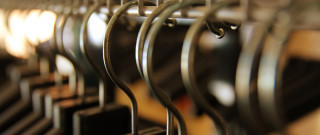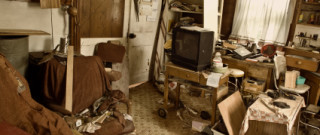FEATURED STORY
Are You Really Going to Wear That Again?
As the seasons shift, you probably turned first to a few core #clothing staples to deal with the cooler temperatures: long sleeves, hoodies, jackets and other transitional garments. Big stacks of cold-weather #garments lie in wait, however, for even harsher weather ahead. The challenge at this point of the year is to decide which garments […]
TALES FROM THE CLOSET

Tales from the Closet brings you all the reading material you need to become and expert at organizing.
ORGANIZING WEBSITES
Use the list of resources below when its time to organize your things. No matter how big or small the job is, you’ll find any one of these websites helpful.
Hoarders Help

It's time to remove the emotional value from the items you never use and the ones that clutter up your home. Remove the clutter and get organizational advice.
Quick Tips
Stock Up on Winter Essentials
Store Outdoor Goods for Next Year
Winterizing Tasks for Your Home
Prepare Your Closets for Winter
- View All
Stock Up on Winter Essentials
While less is more when it comes to #stuff, there are a few things you might want to have at the ready before #winter if you want to be #prepared for the worst. You might need a good snow shovel, de-icer, flashlights and batteries, a weather radio, an emergency car kit, food that doesn’t require preparation, and extra pet food. Even if you aren’t completely snowed-in, you might like to stock up on #winter staples such as flour and sugar for #holiday baking. In many areas, you’ll need a good winter coat and waterproof boots — and you can find a lot of lightly used winter gear at the #thrift stores supplied by generous #donations to ClothingDonations.org.
Store Outdoor Goods for Next Year
If you enjoy #outdoor living when the temperatures are warm (we at The Organizing Blog certainly do), you’ll want to protect your #garden, deck, furniture and other equipment. Start by preparing your garden, says HGTV. #Winterize irrigation systems and mulch the flower beds. Protect outdoor furniture by covering it or storing it in the garage or basement. Likewise with metal outdoor amenities such as barbecue grills and firepits — store them inside or cover them with a waterproof tarp. You may also wish to water-seal wood fences and decks to make them last longer against the snow and sleet. #HomeWinterization
Winterizing Tasks for Your Home
#Winterizing your home is important if you want to catch any issues and make repairs before they become more costly or disruptive. Clean the gutters, cut back overhanging trees, caulk windows and doors against drafts, reverse your ceiling fans, and schedule an inspection and tune-up for the furnace. Also inspect your roof and clean the gutters to keep moisture out, Kiplinger says. And if you want to avoid frozen and burst pipes and they damage they can cause, disconnect all garden hoses, locate shutoff valves for outdoor faucets, drain those faucets completely and insulate them with an outdoor faucet cover. #HomeWinterization
Prepare Your Closets for Winter
One part of prepping your home (and yourself) for #winter involves swapping out #summer #clothing for heavier flannels, sweaters and coats. “With these cold-weather clothing staples about to take up significant closet space, now is the perfect opportunity to stage a clean-out,” says Martha Stewart. “Toss items that are damaged beyond repair, #donate what you no longer wear, and store pieces like swimsuits and sundresses where they’ll be out of the way for the winter season.” You’ll have more room in your closets — and probably several #bags of #donations for a ClothingDonations.org#pickup.
